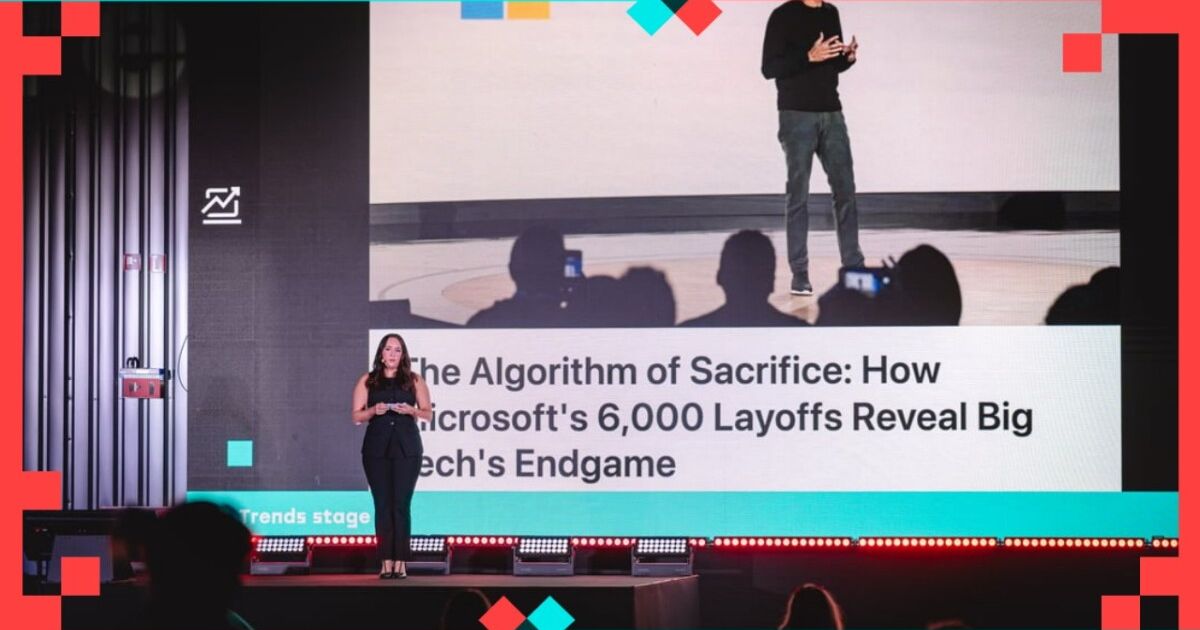VIEW SPEECH SUMMARY
Personal Experience of Being Fired
- The speaker was unexpectedly fired during a meeting with their manager and HR, with no empathy or clear explanation.
- Despite meeting performance goals and having positive feedback, the termination was attributed to performance without transparency.
- This lack of humanity negatively impacted the speaker personally and affected company culture.
Microsoft Layoffs Example
- Microsoft recently laid off 6,000 employees (3% of workforce) without clear criteria, despite strong financials.
- A notable case involved a loyal employee being let go on his birthday, illustrating inhumane treatment.
- These algorithm-driven decisions dehumanize workers and harm morale.
- In 2024, over 150,000 tech layoffs occurred, with many people facing long, difficult job searches.
Case Study: Sarah Wysocki - Teacher Fired by Algorithm
- Sarah, a well-liked 5th-grade teacher, was fired based on an "impact assessment" algorithm relying solely on student test score changes.
- The algorithm ignored critical context like socioeconomic factors, language barriers, and learning disabilities.
- Fear of job loss led some teachers to cheat, inflating scores and creating unrealistic benchmarks.
- The opaque nature of the assessment ("black box") prevented understanding or contesting decisions.
- Resulted in disruption, fear, and deteriorated school culture.
Pattern and Consequences of Data-Driven Decisions Without Humanity
- Across stories, data-based decisions lacking empathy and transparency cause unfair outcomes.
- These decisions damage individuals and undermine overall company or institution culture.
- Emphasizing humanity and empathy in decision-making is crucial for healthy workplaces.
Recommendations for Improving Decision-Making
1. Challenge Default Metrics and KPIs
- Recognize limitations of quantitative data; incorporate qualitative factors like leadership, relationships, loyalty, and impact on others.
2. Advocate for Decision Transparency
- Leaders should explain the why and how of decisions openly.
- Everyone can contribute by providing feedback and exposing blind spots.
3. Incorporate Humanity in Hard Decisions
- Communicate early and honestly to build trust.
- Show empathy and acknowledge human impact even when decisions are difficult.
Key Takeaway
- Data alone cannot capture human complexities; incorporating empathy, transparency, and qualitative context is essential.
- Maintaining humanity, not just focusing on data, sustains positive company culture and respects individuals.
Actionable Items
- Review and expand performance metrics to include qualitative measures.
- Promote transparency by sharing decision criteria and processes publicly.
- Prioritize empathetic communication during difficult organizational changes.
- Encourage feedback loops to identify and address potential blind spots in leadership decisions.
- Recognize the human impact behind algorithmic or data-driven decisions and adapt accordingly.
- The speaker was unexpectedly fired during a meeting with their manager and HR, with no empathy or clear explanation.
- Despite meeting performance goals and having positive feedback, the termination was attributed to performance without transparency.
- This lack of humanity negatively impacted the speaker personally and affected company culture.
Microsoft Layoffs Example
- Microsoft recently laid off 6,000 employees (3% of workforce) without clear criteria, despite strong financials.
- A notable case involved a loyal employee being let go on his birthday, illustrating inhumane treatment.
- These algorithm-driven decisions dehumanize workers and harm morale.
- In 2024, over 150,000 tech layoffs occurred, with many people facing long, difficult job searches.
Case Study: Sarah Wysocki - Teacher Fired by Algorithm
- Sarah, a well-liked 5th-grade teacher, was fired based on an "impact assessment" algorithm relying solely on student test score changes.
- The algorithm ignored critical context like socioeconomic factors, language barriers, and learning disabilities.
- Fear of job loss led some teachers to cheat, inflating scores and creating unrealistic benchmarks.
- The opaque nature of the assessment ("black box") prevented understanding or contesting decisions.
- Resulted in disruption, fear, and deteriorated school culture.
Pattern and Consequences of Data-Driven Decisions Without Humanity
- Across stories, data-based decisions lacking empathy and transparency cause unfair outcomes.
- These decisions damage individuals and undermine overall company or institution culture.
- Emphasizing humanity and empathy in decision-making is crucial for healthy workplaces.
Recommendations for Improving Decision-Making
1. Challenge Default Metrics and KPIs
- Recognize limitations of quantitative data; incorporate qualitative factors like leadership, relationships, loyalty, and impact on others.
2. Advocate for Decision Transparency
- Leaders should explain the why and how of decisions openly.
- Everyone can contribute by providing feedback and exposing blind spots.
3. Incorporate Humanity in Hard Decisions
- Communicate early and honestly to build trust.
- Show empathy and acknowledge human impact even when decisions are difficult.
Key Takeaway
- Data alone cannot capture human complexities; incorporating empathy, transparency, and qualitative context is essential.
- Maintaining humanity, not just focusing on data, sustains positive company culture and respects individuals.
Actionable Items
- Review and expand performance metrics to include qualitative measures.
- Promote transparency by sharing decision criteria and processes publicly.
- Prioritize empathetic communication during difficult organizational changes.
- Encourage feedback loops to identify and address potential blind spots in leadership decisions.
- Recognize the human impact behind algorithmic or data-driven decisions and adapt accordingly.
Staying Human in a Data-Driven World
15:10 - 15:40, 27th of May (Tuesday) 2025 / DEV TRENDS STAGE
In a world obsessed with data, automation, and AI, real impact still comes down to one thing: being unapologetically human. In this keynote, Jess Ramos shows why mixing bold authenticity with smart data strategy isn’t optional anymore - it’s your biggest advantage in a data world that's losing its human touch.
TRACK:
AI/ML
Data



